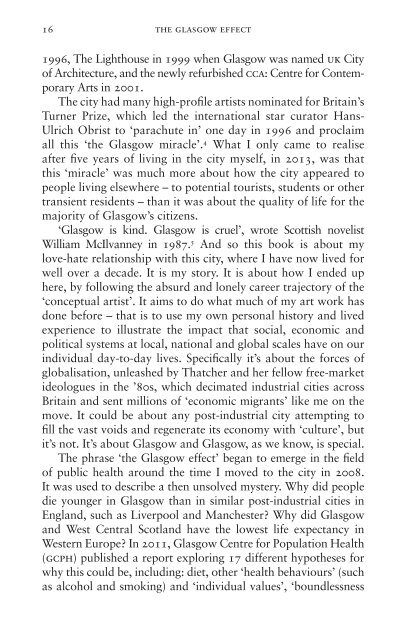Create successful ePaper yourself
Turn your PDF publications into a flip-book with our unique Google optimized e-Paper software.
16 the glasgow effect<br />
1996, <strong>The</strong> Lighthouse in 1999 when <strong>Glasgow</strong> was named uk City<br />
of Architecture, and the newly refurbished cca: Centre for Contemporary<br />
Arts in 2001.<br />
<strong>The</strong> city had many high-profile artists nominated for Britain’s<br />
Turner Prize, which led the international star curator Hans-<br />
Ulrich Obrist to ‘parachute in’ one day in 1996 and proclaim<br />
all this ‘the <strong>Glasgow</strong> miracle’. 4 What I only came to realise<br />
after five years of living in the city myself, in 2013, was that<br />
this ‘miracle’ was much more about how the city appeared to<br />
people living elsewhere – to potential tourists, students or other<br />
transient residents – than it was about the quality of life for the<br />
majority of <strong>Glasgow</strong>’s citizens.<br />
‘<strong>Glasgow</strong> is kind. <strong>Glasgow</strong> is cruel’, wrote Scottish novelist<br />
William McIlvanney in 1987. 5 And so this book is about my<br />
love-hate relationship with this city, where I have now lived for<br />
well over a decade. It is my story. It is about how I ended up<br />
here, <strong>by</strong> following the absurd and lonely career trajectory of the<br />
‘conceptual artist’. It aims to do what much of my art work has<br />
done before – that is to use my own personal history and lived<br />
experience to illustrate the impact that social, economic and<br />
political systems at local, national and global scales have on our<br />
individual day-to-day lives. Specifically it’s about the forces of<br />
globalisation, unleashed <strong>by</strong> Thatcher and her fellow free-market<br />
ideologues in the ’80s, which decimated industrial cities across<br />
Britain and sent millions of ‘economic migrants’ like me on the<br />
move. It could be about any post-industrial city attempting to<br />
fill the vast voids and regenerate its economy with ‘culture’, but<br />
it’s not. It’s about <strong>Glasgow</strong> and <strong>Glasgow</strong>, as we know, is special.<br />
<strong>The</strong> phrase ‘the <strong>Glasgow</strong> effect’ began to emerge in the field<br />
of public health around the time I moved to the city in 2008.<br />
It was used to describe a then unsolved mystery. Why did people<br />
die younger in <strong>Glasgow</strong> than in similar post-industrial cities in<br />
England, such as Liverpool and Manchester? Why did <strong>Glasgow</strong><br />
and West Central Scotland have the lowest life expectancy in<br />
Western Europe? In 2011, <strong>Glasgow</strong> Centre for Population Health<br />
(gcph) published a report exploring 17 different hypotheses for<br />
why this could be, including: diet, other ‘health behaviours’ (such<br />
as alcohol and smoking) and ‘individual values’, ‘boundlessness


















